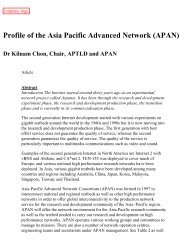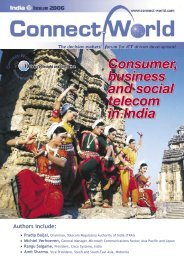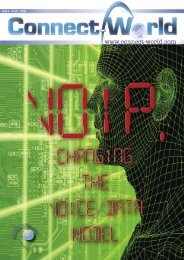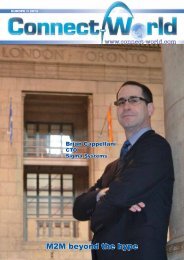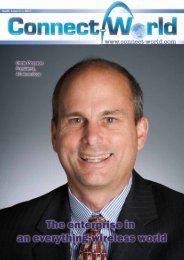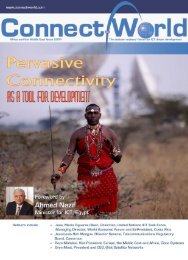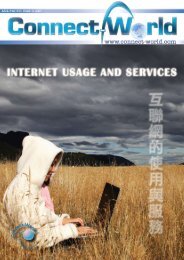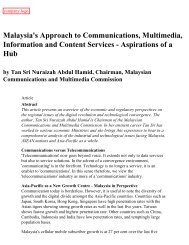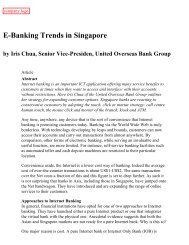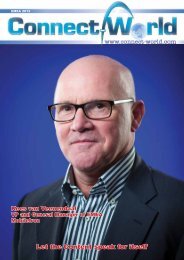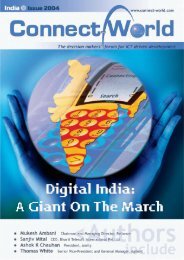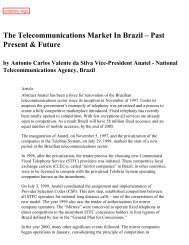Contents - Connect-World
Contents - Connect-World
Contents - Connect-World
You also want an ePaper? Increase the reach of your titles
YUMPU automatically turns print PDFs into web optimized ePapers that Google loves.
Developing Regions and Technology<br />
<strong>Connect</strong>ing peopleNew technologies, new hope<br />
by Bill Owens, President and CEO, Nortel Networks<br />
The <strong>World</strong> Bank estimates half the people in the world live on less than $2 a day and telephone<br />
service is still a luxury for them. Half of Africas 800 million people and 75 per<br />
cent of China’s 1.3 billion inhabitants have never made a phone call. Converged networks,<br />
based on packet technologies, can lower the cost of communications, make it<br />
affordable for this population, and revolutionize many aspects of their lives—how they<br />
work, learn, receive medical services, travel and entertain.<br />
Bill Owens is President and Chief Executive Officer of Nortel Networks. Previously, Mr Owens was chief executive officer<br />
and chairman of Teledesic LLC and President, Chief Operating Officer and Vice-Chairman of Science Applications<br />
International Corporation (SAIC), the USs largest employee-owned high-technology company. Prior to joining SAIC,<br />
Owens was vice-chairman of the Joint Chiefs of Staff and the second-ranking military officer in the United States. Mr<br />
Owens had responsibility for the re-organisation and re-structuring of the United States armed forces in the post-Cold<br />
War era. Previously, Bill Owens served as deputy chief of Naval Operations for Resources, Warfare Requirements and<br />
Assessments, commander of the US Sixth Fleet and as senior military assistant to Secretaries of Defense Frank Carlucci<br />
and Dick Cheney, the senior military position in the Office of the Secretary of Defense.<br />
Mr Owens has written more than 50 articles on national security and authored the book High Seas. Mr Owens latest<br />
book, Lifting the Fog of War, was published in April 2000. Bill Owens is a graduate of the US Naval Academy with a<br />
bachelor’s degree in mathematics. Mr Owens has a bachelor and masters degrees in politics, philosophy and economics<br />
from Oxford University and a masters in management from George Washington University. Mr Owens is the<br />
founder of Extend America, a five-year state wireless telecommunications venture and also sits on the public boards of<br />
Nortel Networks and Daimler Chrysler AG. Mr Owens is the senior advisor to AEA Investors LLC and is a member of<br />
several philanthropic boards including the Carnegie Foundation, Brookings Institution and the Fred Hutchinson<br />
Cancer Research Centre. Bill Owens is also a member of the Canadian Council of Chief Executives.<br />
<strong>Connect</strong>ing people<br />
The world is moving faster and change<br />
is occurring at a tremendous pace.<br />
Communications is an integral part of<br />
that change, with its new technologies<br />
revolutionising so many aspects of our<br />
lives—the way we work, learn, receive<br />
medical services, travel and entertain.<br />
In short, communications is changing<br />
the way we live and this can be as true<br />
for emerging markets as it is in more<br />
developed parts of the world.<br />
While the broad implementation of<br />
new technologies, and the new services<br />
they make possible, translates into an<br />
exciting time for the communications<br />
industry, it holds the potential to be an<br />
exciting time for emerging regions as<br />
well.<br />
These new services can have a profound<br />
impact, by connecting people<br />
and providing new hope for improved<br />
standards of living, through education,<br />
medical care, commerce and global<br />
trade. Yet, for the great promise of<br />
communications to be realised, great<br />
challenges have to be overcome. The<br />
<strong>World</strong> Bank estimates half the people<br />
in the world live on less than $2 a day<br />
and telephone service is still a luxury<br />
in parts of the world.Half of Africa’s<br />
estimated 800 million people and 75<br />
per cent of China’s 1.3 billion population<br />
have never made a phone call.<br />
Although China is the world’s largest<br />
telecommunications market in terms<br />
of total subscribers, the number of<br />
telephones per 100 people is still relatively<br />
low with a large gap between<br />
urban and rural services, an inequity<br />
that is very common in emerging markets<br />
in many parts of the world.<br />
At the first <strong>World</strong> Summit on the<br />
Information Society held late last year<br />
in Geneva, some 11,000 delegates from<br />
more than 175 countries, came together<br />
to focus on shaping a global commitment<br />
to co-operation among governments,<br />
private business and civil<br />
society to help bridge the digital divide<br />
that separates emerging markets from<br />
the more developed countries. Among<br />
the long-term objectives confirmed at<br />
the summit was to connect all schools,<br />
villages, governments and hospitals<br />
with information communication technologies<br />
(ICTs) by 2015. Work is progressing<br />
to the second phase of the<br />
summit to be held in Tunis in late<br />
2005 where the agenda will include<br />
questions on infrastructure financing,<br />
which is a leading concern in many<br />
emerging markets.<br />
"The power of information and communication<br />
technology is removing the<br />
boundaries of time and space, which<br />
have long kept us apart. But too many<br />
people in the world are deprived of<br />
access to information and to the tools<br />
for accessing it," International<br />
Telecommunication Union (ITU)<br />
Secretary-General Yoshito Utsumi told<br />
the summit. He added: "From trade to<br />
telemedicine, from education to environmental<br />
protection, we have in our<br />
hands, on our desktopsthe ability to<br />
improve standards of living for millions<br />
upon millions of people."<br />
To see the transformation of communities,<br />
when the power of communications<br />
is provided, is empowering,<br />
uplifting and inspiring. <strong>Connect</strong>ing<br />
26



